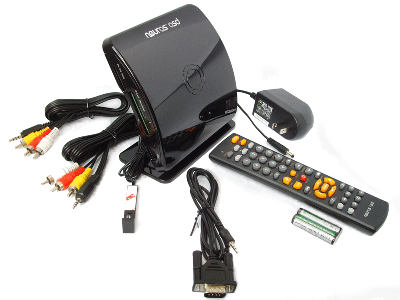Here’s a summary of the week’s digital lifestyle action on last100. Note that you can subscribe to the weekly wrapups, either via the special weekly wrapup RSS feed or by email.
Continue reading »
Here’s a summary of the week’s digital lifestyle action on last100. Note that you can subscribe to the weekly wrapups, either via the special weekly wrapup RSS feed or by email.
Continue reading »
 Vuze is an application for Mac or PC that allows users to search, browse, and download ‘near DVD’ and HD quality video content, using the peer-to-peer protocol, BitTorrent. In particular the company is pitching the platform as a way for independent video and film producers to distribute their content to millions of users — at no cost — and with a higher picture quality than other competing services. In addition to being an open platform where anybody can publish their content, Vuze has signed licensing deals with a number of larger players, such as the BBC, A&E, and Showtime, who are offering paid-for content (rental and to-own). Curiously, Vuze is also being used to distribute music and computer games.
Vuze is an application for Mac or PC that allows users to search, browse, and download ‘near DVD’ and HD quality video content, using the peer-to-peer protocol, BitTorrent. In particular the company is pitching the platform as a way for independent video and film producers to distribute their content to millions of users — at no cost — and with a higher picture quality than other competing services. In addition to being an open platform where anybody can publish their content, Vuze has signed licensing deals with a number of larger players, such as the BBC, A&E, and Showtime, who are offering paid-for content (rental and to-own). Curiously, Vuze is also being used to distribute music and computer games.
Continue reading »
 Skype was touted as one of the killer-apps for Nokia’s newest version of its WiFi Internet tablet, the N800, and yet the Voice-over-IP software was noticeable by its absence when the device was released earlier this year — although support for Gizmo and Google Talk was included. However, that’s set to change.
Skype was touted as one of the killer-apps for Nokia’s newest version of its WiFi Internet tablet, the N800, and yet the Voice-over-IP software was noticeable by its absence when the device was released earlier this year — although support for Gizmo and Google Talk was included. However, that’s set to change.
Reporting from Digital Experience in New York, jkOnTheRun’s Kevin Tofel stopped by at Nokia’s booth where he saw a a demonstration of Skype running on the N800. Better still, the software should be available for download sometime in July. On the downside, however, they’ll be no video conferencing support, despite the device’s built-in webcam.
With all media attention focused on the iPhone, it’s worth mentioning that there’s almost zero chance of VoIP functionality coming to Apple’s device any time soon.
Related post: iPhone: exploring the limits of third-party apps
 Media streaming boxes such as the AppleTV, XBox 360, PS3, and products from Netgear, do a varying job of bridging the gap between the PC and television, as well as in some cases, delivering Internet content directly into the living room. But all are closed systems. The result of which is that users are left trying to hack these devices against the wishes of manufacturers (see our post ‘When will Steve Jobs open up the AppleTV?‘) or have to make-do with whatever official features are implemented. Bucking this trend, Neuros is taking a wholly different approach, and has open-sourced the firmware for it’s Neuros OSD media-center, meaning that anybody is free to write add-ons that extend the device’s functionality.
Media streaming boxes such as the AppleTV, XBox 360, PS3, and products from Netgear, do a varying job of bridging the gap between the PC and television, as well as in some cases, delivering Internet content directly into the living room. But all are closed systems. The result of which is that users are left trying to hack these devices against the wishes of manufacturers (see our post ‘When will Steve Jobs open up the AppleTV?‘) or have to make-do with whatever official features are implemented. Bucking this trend, Neuros is taking a wholly different approach, and has open-sourced the firmware for it’s Neuros OSD media-center, meaning that anybody is free to write add-ons that extend the device’s functionality.

The Neuros OSD is a versatile box that can act as a Digital Video Recorder capable of recording from virtually any source (cable or satellite TV, DVD, DVR/TiVoTM, VCR, game console, camcorder, etc), as well as stream and share video, music and photos between various devices including home entertainment centers, PCs and portables such as laptops, iPods, smartphones, and the PSP.
Continue reading »
 YouTube accounts for ten percent of all North American Internet traffic, according to a recent report (PDF) by Ellacoya Networks. Based on data of approximately one million broadband subscribers in North America, the study also revealed that — bucking a four year trend — HTTP traffic now surpasses that of p2p, largely due to the proliferation of video streaming sites such as YouTube. Remember that for years it has been p2p traffic that’s dominated broadband usage, as users download pirated music and movies over p2p file-sharing networks.
YouTube accounts for ten percent of all North American Internet traffic, according to a recent report (PDF) by Ellacoya Networks. Based on data of approximately one million broadband subscribers in North America, the study also revealed that — bucking a four year trend — HTTP traffic now surpasses that of p2p, largely due to the proliferation of video streaming sites such as YouTube. Remember that for years it has been p2p traffic that’s dominated broadband usage, as users download pirated music and movies over p2p file-sharing networks.
Continue reading »
 The Open Source Consortium (OSC) is threatening to lodge a complaint with the European Commision over the BBC’s soon-to-be launched iPlayer. The UK-only Internet TV catch-up service utilizes Microsoft’s DRM technology, and so won’t work on non-Windows operating systems such as Mac or Linux, which, the OSC says, will force viewers to buy or use a PC, giving Microsoft an unfair and uncompetitive advantage.
The Open Source Consortium (OSC) is threatening to lodge a complaint with the European Commision over the BBC’s soon-to-be launched iPlayer. The UK-only Internet TV catch-up service utilizes Microsoft’s DRM technology, and so won’t work on non-Windows operating systems such as Mac or Linux, which, the OSC says, will force viewers to buy or use a PC, giving Microsoft an unfair and uncompetitive advantage.
Although the decision on what operating systems to support is usually a commercial one, the BBC faces wider criticism because of its public service broadcaster status, and the fact that the corporation is funded by British tax payers.
Continue reading »
 The Beta version of Real’s latest media player, RealPlayer 11, is now available for download from the company’s website. We previously wrote an extensive review of the software, noting its flagship feature: the ability to download and save online video from virtually any website.
The Beta version of Real’s latest media player, RealPlayer 11, is now available for download from the company’s website. We previously wrote an extensive review of the software, noting its flagship feature: the ability to download and save online video from virtually any website.
While it will be hard for RealPlayer to shake off its poor reputation, there’s much to like about version 11. The new interface and jukebox functionality has been appropriately borrowed from iTunes, and the ability to download and save videos from the web, not only works well, but should prove popular with users who want to build their own personal video collection.
In a later post, we followed up by asking whether Real’s new download feature might actually encourage online video producers to use more DRM.
Now you can try out the new version for yourself, available from Real’s site. (Note: this is a Beta version and users are already noting issues and complaining that it’s hard to find and re-install the previous version.)
 If you try to “tune in” to many Internet radio stations and online music services today, and hear nothing, here’s why: protesting against an impending royalty rate increase that, if implemented, would lead to many services having to shut down, webcasters across the US are holding a national Day of Silence.
If you try to “tune in” to many Internet radio stations and online music services today, and hear nothing, here’s why: protesting against an impending royalty rate increase that, if implemented, would lead to many services having to shut down, webcasters across the US are holding a national Day of Silence.
Organised by the Save Net Radio Coalition, thousands of US-based webcasters have turned off the music and gone silent in a unified effort to draw attention to the 300% royalty hike.
Continue reading »
 In a recent guest post, Tim Robertson looked at the Wii’s media handling capabilities and concluded that the Wii is no media center, lacking the ability to stream photos, videos or music over a home network. On the plus side, Nintendo’s latest console does have a fully-fledged web browser capable of accessing flash-based audio and video from sites like YouTube.
In a recent guest post, Tim Robertson looked at the Wii’s media handling capabilities and concluded that the Wii is no media center, lacking the ability to stream photos, videos or music over a home network. On the plus side, Nintendo’s latest console does have a fully-fledged web browser capable of accessing flash-based audio and video from sites like YouTube.
Finally biting the bullet, early last week I bought myself a Wii, and in between golf and tennis sessions I decided to try and push the limits of the console’s media-playback functionality. After a bit of research and with the help of a number of web sites optimized for the Wii and a few software downloads, I was able to fudge together a fairly capable Wii-based media center.
Here are five applications and websites needed to create your own Wii media center…
Continue reading »
 VentureBeat is reporting that the San Francisco-based startup, Revision3, has raised a further $8million of funding, bringing their total investment to $9 million. Revision3 concentrates on producing niche online video content such as the geek news show, Diggnation, and the cooking series, ‘Ctrl-Alt-Chicken’. The company’s founders include Kevin Rose and Jay Adelson, the same team behind the hugely popular social news site, Digg.com.
VentureBeat is reporting that the San Francisco-based startup, Revision3, has raised a further $8million of funding, bringing their total investment to $9 million. Revision3 concentrates on producing niche online video content such as the geek news show, Diggnation, and the cooking series, ‘Ctrl-Alt-Chicken’. The company’s founders include Kevin Rose and Jay Adelson, the same team behind the hugely popular social news site, Digg.com.
What makes this news particularly significant is that it’s is a substantial investment in content rather than a distribution platform (as is the case with most other Internet startups such as Joost or Veoh for example).
A few more key take-aways from the VentureBeat article…
Continue reading »